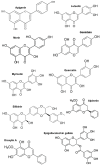Targeting Inflammation by Flavonoids: Novel Therapeutic Strategy for Metabolic Disorders
- PMID: 31597283
- PMCID: PMC6801776
- DOI: 10.3390/ijms20194957
Targeting Inflammation by Flavonoids: Novel Therapeutic Strategy for Metabolic Disorders
Abstract
A balanced metabolic profile is essential for normal human physiological activities. Disproportions in nutrition give rise to imbalances in metabolism that are associated with aberrant immune function and an elevated risk for inflammatory-associated disorders. Inflammation is a complex process, and numerous mediators affect inflammation-mediated disorders. The available clinical modalities do not effectively address the underlying diseases but rather relieve the symptoms. Therefore, novel targeted agents have the potential to normalize the metabolic system and, thus, provide meaningful therapy to the underlying disorder. In this connection, polyphenols, the well-known and extensively studied phytochemical moieties, were evaluated for their effective role in the restoration of metabolism via various mechanistic signaling pathways. The various flavonoids that we observed in this comprehensive review interfere with the metabolic events that induce inflammation. The mechanisms via which the polyphenols, in particular flavonoids, act provide a promising treatment option for inflammatory disorders. However, detailed clinical studies of such molecules are required to decide their clinical fate.
Keywords: flavonoids; inflammation; inflammatory mediators; metabolic disorders; nuclear factor-κB; oxidative stress.
Conflict of interest statement
The authors declare no conflicts of interest.
Figures



References
-
- LeRoith D., Taylor S.I., Olefsky J.M. Diabetes Mellitus: A Fundamental and Clinical Text. Lippincott Williams & Wilkins; Philadelphia, PA, USA: 2004.
-
- Hurley J.V.J.V. Acute Inflammation. Churchill Livingstone; Edinburgh, UK: 1972.
-
- Feghali C.A., Wright T.M. Cytokines in acute and chronic inflammation. Front. Biosci. 1997;2:12–26. - PubMed
Publication types
MeSH terms
Substances
LinkOut - more resources
Full Text Sources
Medical

